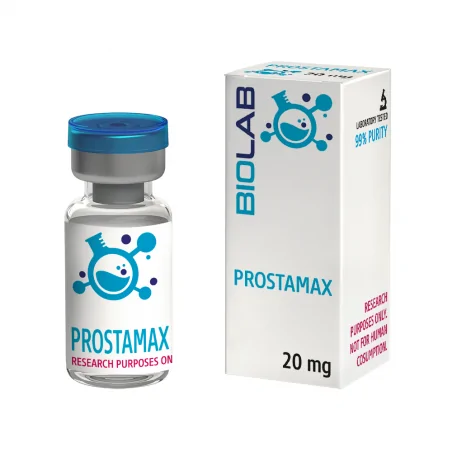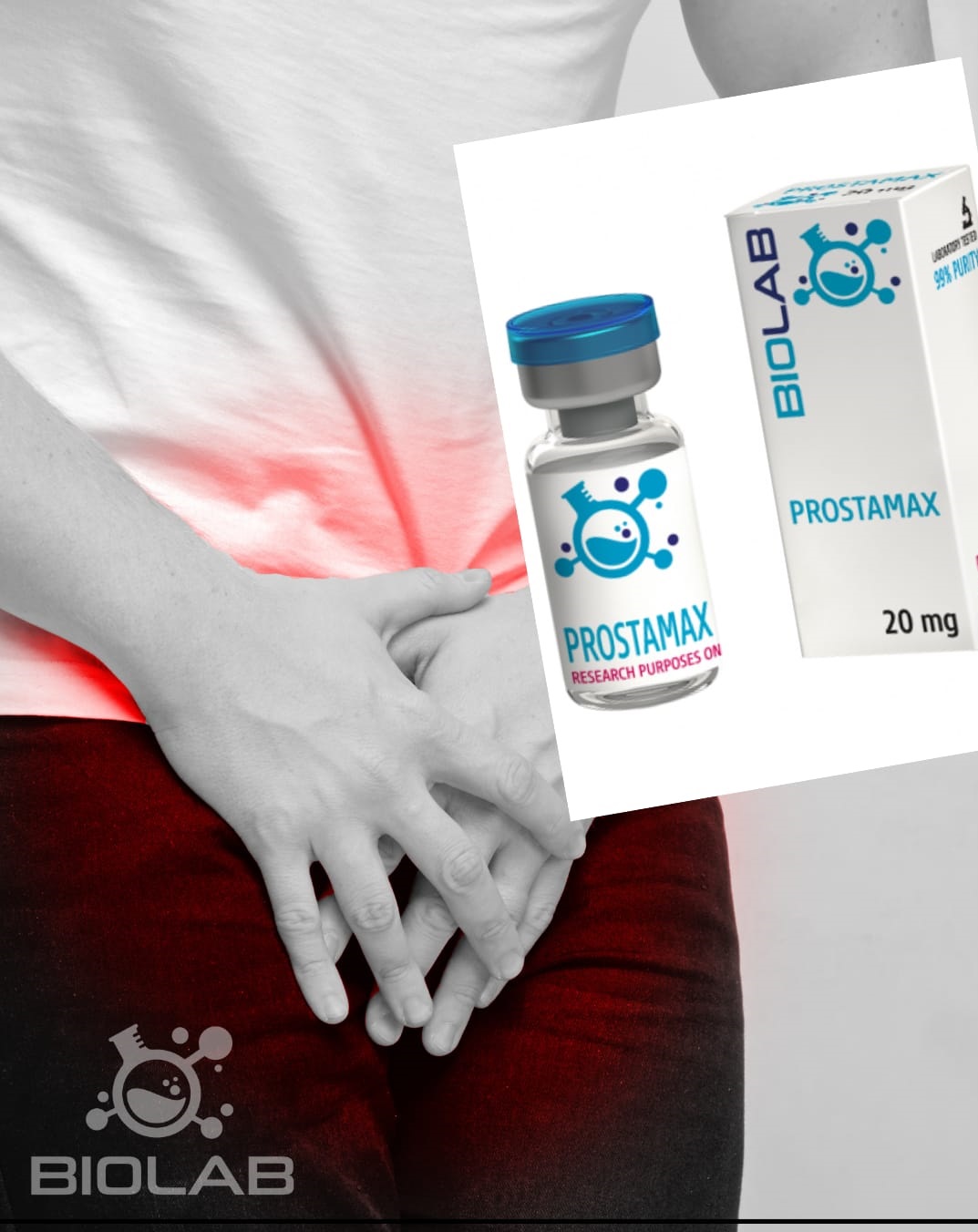
PROSTAMAX 20mg
Product code:
Buy 3 and get 3% discount
Buy 5 and get 5% discount




Product code:


















PROSTAMAX 20mg
Prostamax is a synthetic Khavinson peptide with a primary repair effect in the prostate.

The peptide has also been shown to improve lymphocyte function and alter DNA expression patterns in other tissues. Prostamax is considered one of Khavinson's anti-ageing peptides with a broader spectrum of action, as it promotes heterochromatin decondensation in a wide variety of cells. Studies in rats indicate that Prostmax may be useful in the treatment of chronic prostatitis.
Chronic prostatitis affects as many as 16% of men at some point in their lives. It is a painful condition that causes burning when urinating, urgency, and difficulty urinating. It can even cause difficult or painful ejaculation along with lower back pain. It is a very difficult condition to treat, often requiring long-term, months-long treatment with antibiotics. There is also good evidence to suggest that it can lead to cardiovascular disease and even cancer, so treating prostatitis is critical to long-term health.
Studies in rat models show that prostatitis can be treated with Prostamax, which reduces signs and symptoms of the disease. Rats treated with it for just 15 days showed reduced swelling of the prostate gland along with less congestion of blood vessels, as well as less infiltration by immune cells. Interestingly, the rats also showed reduced levels of scarring in the prostate, indicating that the reduction in inflammation slowed or even stopped pathological remodeling. Although the study was not conducted on a sufficient number of rats to assess the effect of Prostamax on cancer risk, the results suggest that the peptide can probably reduce risk by reducing chronic inflammation that leads to pathological hypertrophy and hyperplasia.
The above study on Prostamax is particularly exciting because it was effective in treating a form of prostatitis called chronic bacterial prostatitis (CAP). CAP is the most common form of prostatitis, but it is difficult to treat because it is not caused by a bacterial infection. Bacterial infections respond easily to antibiotics. CAP, on the other hand, does not respond as well to antibiotic treatment, and sometimes does not respond at all. It is also more likely to recur and has been shown to be extremely frustrating for those who suffer from it. Having an alternative treatment that is effective for CAP can improve the quality of life for many men and prevent future disease. Finding a treatment for CAP is more important than ever, as the number of cases of the disease has increased nearly 3-fold since the late 20th century. Although Prostamax is thought to be a tissue-specific peptide, there is ample evidence that it acts on cells outside the prostate.
The most consistent effect is on ribosomes and densely packed chromatin found in lymphocytes. In these cells, Prostamax, like Epithalon, serves to increase the expression of ribosomes, which are responsible for translating mRNA into proteins. It also opens up the densely packed chromatin to make genes more accessible for transcription into mRNA. Thus, lymphocytes. Prostamax's effect on the immune system is not just theoretical. Studies show that the peptide helps reduce symptoms of chronic prostatitis, including swelling, congestion, and lymphocyte infiltration.
Prostamax and aging
The effect that Prostamax has on lymphocytes and prostate cells is part of a larger effect it has on many different cell types. Studies on cell cultures taken from older individuals show that Prostamax alters DNA structure by decondensing heterochromatin. This, in turn, allows for greater expression of DNA that has been deactivated by densely packed DNA. What makes this unusual in the context of aging is that DNA condensation is a normal, albeit undesirable, consequence of aging. DNA CONDENSATION is a major driver of both aging and apoptosis, making it one of the most important mechanisms of aging. By unwrapping DNA, Prostamax literally gives cells a more youthful genetic profile. The result is increased cell proliferation, reduced apoptosis (programmed cell death) and improved protein expression and cell function. Interestingly, Prostamax and similar epigenetically active peptides occur naturally in long-lived rodent species, such as the African mole rat. The same peptides are not found in short-lived species. This indicates that the epigenetic effects that have been with peptides such as Prostamax are in fact directly related to aging and longevity.
https://pubmed.ncbi.nlm.nih.gov/17152728/
https://www.health.harvard.edu/mens-health/treating-chronic-prostatitis

Your review appreciation cannot be sent
Report comment
Report sent
Your report cannot be sent
Write your review
Review sent
Your review cannot be sent
Customers who bought this product also bought:
IPAMORELIN + MOD GRF 1-29...
VITAMIN D 5000iu
SR 9009 Stenabolic 30ml 900mg
NAD+
N-ACETYL SELANK SPRAY 10mg
BULK LIKE HULK 277,5mg
BCAA 20mg 2:1:1 RATIO
SEMAX SPRAY 50mg
Newsletter
SIGN UP AND STAY UP TO DATE!
We specialize in wholesale and retail supply of high quality peptides.
Category
Our company
Add to wishlist
((title))
Sign in
You need to be logged in to save products in your wishlist.